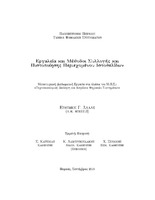Εργαλεία και μέθοδοι συλλογής και πιστοποίησης περιεχομένου ιστοσελίδων

View/
Subject
Ιστότοποι ; Διαδίκτυο (Internet) ; Τυποποίηση ; Ποιοτικός έλεγχοςAbstract
It is an undisputable fact that nowadays many different types of crime a¬re conducted by utilizing some type of electronic device - communication. To address this new situation, modern forensics tools evolved, becoming so¬phisticated enough to handle almost all kinds of digital content. However, collecting and validating the authenticity of online content remains, until no¬w, a problem to resolve. This has to do with many reasons, but mainly with the dynamic and unstructured nature of the internet and the web. The common practice for preserving online content for evidentiary purpo¬ses is to capture (screen-shot) or save a web page, the authenticity of which is usually validated in a judicial process by an expert's testimony. Other methods suggest video recording a browsing session, utilizing free or comme¬rcial services for content preservation, or having the creator of the web page testify about its content at a specified date and time. In this thesis, we analyze the legal aspects of presenting online content as evidence, and we list all criteria for acceptable online content preserva¬tion. Next, we present all available methods for content preservation and we see how they fit to the criteria previously stated. Finally, we introduce PRoCAVE, a simple software architecture with a set of accompanying proce¬dures, and we argue that their combined use can deliver evidence from online sources in the court, in a sound and privacy-preserving manner. Part of this work was accepted for publication in the proceedings of the 10th International Conference on Trust, Privacy & Security in Digital Busi¬ness (TrustBus 2013).


